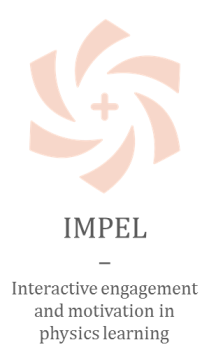About the project
IMPEL is a physics education research project that investigates student motivation, views on learning and disciplinary identity in university physics. We study students' development of motivation and views on learning in interactive engagement, computational, and more traditional learning activities. The goal is to improve physics education to meet the needs of both students and society.
Goals
The project aims to improve university physics education through developing knowledge about
- students' development of motivation, views on learning and physics identity during their first two years of studying physics
- students' experiences with interactive engagement and computational learning activities in physics in a Scandinavian context
- learning assistants (LAs) experiences and development as participants in the Learning Assistant program at the University of Oslo.
- students' experiences and development of motivation in times of remote teaching due to the covid-19 pandemic
Implications from the project will inform development of teaching practices, learning resources, and physics education study programs at large, allowing a broad spectrum of physics students to develop their motivation for learning physics and for becoming physicists, for the benefit of themselves, the University, and society.
Activities and results
Paper about the implementation of the learning assistant model in Europe:
Odden, Tor Ole Bigton; Lauvland, Anders; Bøe, Maria Vetleseter & Henriksen, Ellen Karoline (2023). Implementing the Learning Assistant Model in European higher education. European Journal of Physics. ISSN 0143-0807. doi: 10.1088/1361-6404/acb39e. Fulltekst i vitenarkiv
Paper about high-achieving physics students and physics identity:
Bøe, Maria Vetleseter (2023). Staying recognised as clever: high-achieving physics students' identity performances. Physics Education. ISSN 0031-9120. 58(3). doi: 10.1088/1361-6552/acbad9.
The project participated at the digital ESERA conference in August 2021:
Lauvland, A., Bøe, M. V., & Henriksen, E. K. (2021): Motivation profiles among first-year physics students. Presented at the ESERA Conference 2021, Braga, Portugal
The second round of survey data collection was administered in April 2021 among first and second year physics students at The Arctic University of Norway, Norwegian University of Science and Technology, Norwegian University of Life Sciences, University of Bergen, and University of Oslo. Focus groups with the same students from UiO that participated in 2020, were conducted in May and June 2021.
The first round of survey data collection was administered in the Autumn 2019 and Spring 2020 among first year physics students at The Arctic University of Norway, Norwegian University of Science and Technology, Norwegian University of Life Sciences, University of Bergen, and University of Oslo. Focus groups were conducted in January and May 2020 with physics students at University of Oslo, both in normal and pandemic conditions.
A pilot survey study was conducted in May 2019 among physics students at University of Oslo. Analysis of the pilot study was used to improve and validate the instrument for the upcoming 2020 and 2021 data collections.
In August 2019, IMPEL participated at the ESERA 2019 conference:
Lauvland, A., Odden, T. O., Bøe, M. V., & Henriksen, E. K. (2019): Learning Assistants transformed views on teaching and the teacher role after a training programme. Presented at the ESERA Conference 2019, Bologna, Italy
Research on the Learning Assistant Program at University of Oslo was initiated in the Autumn 2018 using surveys and focus groups interviews among learning assistants in the program.
Background
The IMPEL project is based on the following points from the physics education research literature:
- University physics teaching is changing from traditional to more interactive engagement and computational learning activities.
- Students' motivation and disciplinary identity is closely connected to learning and persistence in physics, but there is little research on how their motivation and disciplinary identity interacts with interactive engagement and computational learning activities.
- Previous physics education research suggests that traditional teaching and disciplinary cultures fail to meet the broad spectrum of physics students' motivations and identities.
- There is very little research on the use of interactive engagement methods in university physics in a Scandinavian context.
Methods and theoretical perspectives
IMPEL uses both quantitative and qualitative research methods. Different aspects of students' motivation, disciplinary identity, and views on learning are measured over time in a survey, and the data are analysed using statistical, psychometric methods and software tools. In addition, students' experiences and motivation are investigated through repeated qualitative focus group interviews. Learning assistants' experiences are studied throug surveys, observations, and focus group interviews.
Theoretical perspectives on motivation, namely expectancy-value theory and self-determination theory, are used to analyse and interpret the results. We also draw on theories on science and physics identity.
Collaborations
IMPEL is lead by the Research Section for Physics Education at UiO and collaborates with CCSE - Centre for Computing in Science Education, in particular in reserach related to the Learning Assistant Program at UiO, lead by Associate Professor Tor Ole Odden at CCSE. IMPEL also collaborates with physics departments at the following Norwegian universities: The Arctic University of Norway, Norwegian University of Science and Technology, Norwegian University of Life Sciences, and University of Bergen.
